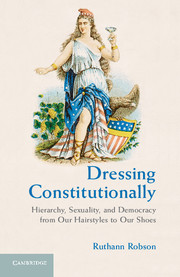
- Cited by 8
-
Cited byCrossref Citations
This Book has been cited by the following publications. This list is generated based on data provided by Crossref.
Davis, Alexander K 2015. Epiphenomenology of the closet: Feeling and fashioning sexuality in everyday life. Sexualities, Vol. 18, Issue. 8, p. 959.
von Busch, Otto 2018. Inclusive Fashion—an Oxymoron—or a Possibility for Sustainable Fashion?. Fashion Practice, Vol. 10, Issue. 3, p. 311.
Wan, Marco 2018. Feminist Literary Theory and the Law: Reading Cases with Naomi Schor. Feminist Legal Studies, Vol. 26, Issue. 2, p. 163.
Baldi, Giorgia 2021. Un-Veiling Dichotomies. p. 17.
Suhomlinova, Olga O’Shea, Saoirse Caitlin and Boncori, Ilaria 2023. Rethinking gender diversity: Transgender and gender nonconforming people and gender as constellation. Gender, Work & Organization,
Gonzalo Quiroga, Marta 2023. Fashion Law y Derecho Internacional Privado: diseño y confección jurídica en un marco globalizado. Justicia, Vol. 28, Issue. 44, p. 65.
Von Busch, Otto 2023. Fashion and Feeling. p. 211.
Scott, Paul 2023. Décolletage disputes in early modern France. The Seventeenth Century, Vol. 38, Issue. 5, p. 853.
- Publisher:
- Cambridge University Press
- Online publication date:
- July 2013
- Print publication year:
- 2013
- Online ISBN:
- 9781139028059
- Subjects:
- Constitutional and Administrative Law, Law




